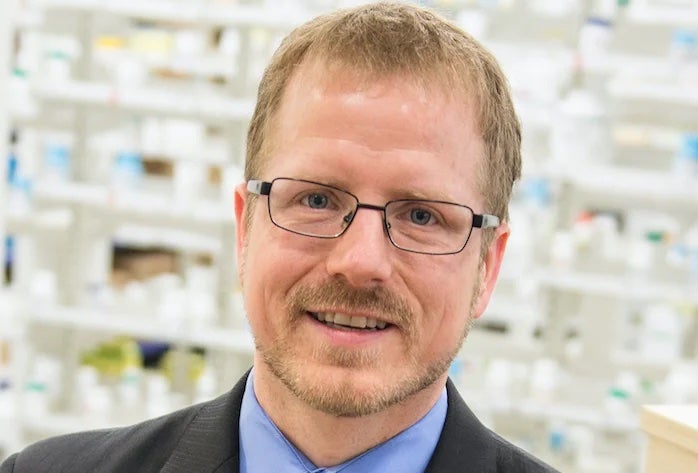The $455,000 grant from the Foundation for Opioid Response Efforts will fund training for local pharmacists to prescribe, administer medications
The University of Rhode Island College of Pharmacy will further the fight against the ongoing opioid epidemic thanks to a new $455,000 grant from the Foundation for Opioid Response Efforts to train pharmacists to prescribe and dispense medications for opioid use disorder.
Led by Clinical Professor Jeffrey Bratberg, the College of Pharmacy will initiate two novel approaches to providing medications for opioid use disorder via community pharmacies, particularly in areas where physician prescribers are limited. First, a collaborative practice agreement developed in Rhode Island, in which a pharmacist is allowed to prescribe and treat a specific condition under the supervision and authority of a licensed physician, will be adapted and implemented in Connecticut. It will enable pharmacists in that state to be trained to initiate buprenorphine and provide maintenance care to people with opioid use disorder.
Second, a protocol for informing patients, starting treatment, and providing ongoing care will be implemented in community pharmacies in Ohio, where Drug Enforcement Administration-licensed pharmacists can prescribe controlled substances. The Legislative Analysis and Public Policy Association, through this funding to URI, will also conduct a state-by-state review of pharmacy regulations and develop toolkits for pharmacies in other states with the goal of expanding these new approaches to community pharmacies across the United States.
“I look forward to exploring and documenting the most effective ways to build sustainable addiction treatment models in community pharmacies,” Bratberg said. “As key access points for harm reduction services like naloxone, sterile syringes, and medication for opioid use disorder, pharmacists play an essential role in addressing the overdose crisis.”
The award is part of $1.3 million in new grants FORE awarded as part of a mission to improve access to lifesaving opioid use disorder medications, which are key to reversing overdoses. Only about 18 percent of people with opioid use disorder report the use of lifesaving medications like buprenorphine in their recovery, despite efforts to increase the number of providers who can prescribe it.
“Medications for treatment of opioid use disorder save lives, but access to these medications is often limited creating gaps in care for patients at highest risk for overdose,” said Karen Scott, president of the Foundation for Opioid Response Efforts. “Pharmacies have a critical role in ensuring that patients receive the medications they need in a timely manner. We are providing funding to support access to treatment at this key access point.”
Bratberg has a history of working to improve access to medications to treat opioid use disorder. During his time at URI, he has established an overdose education and naloxone training program for pharmacists in the first-in-nation statewide Collaborative Pharmacy Practice Agreement for naloxone, and led a study published in the New England Journal of Medicine showing patients with opioid use disorder can safely receive treatment in a community pharmacy, and that they are more likely to follow up with treatment. Bratberg played a key role in the American Pharmacists Association’s policy statements expressing support for decriminalizing the personal possession or use of illicit drugs and drug paraphernalia; serves on the Rhode Island Governor’s Overdose Prevention and Intervention Task Force, and has led several research efforts on the subject, funded by multiple national organizations.

